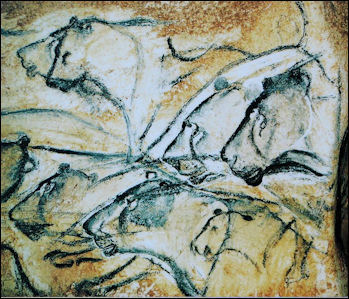There is a story that Picasso, on seeing the cave paintings at Lascaux/Altimara said "we have learnt nothing in 12,000 years". On the one hand, like many of these little stories, it may be apocryphal. On the other; if he had said it, he would have been right:
There has been a civil war in Thebes (Greek Thebes, not the Egyptian one) following the death of Oedipus. Oedipus' two sons have been on opposite sides of the the war and, before the play opens, have managed to kill each other. A chap called Creon (also related to Oedipus) becomes King and decides to restore some order. He orders the burial of one brother, Eteocles, who was a good chap. The other, Polyneices, though:
came back from exile, and sought to consume utterly with fire the city of his fathers and the shrines of his fathers' gods, sought to taste of kindred blood, and to lead the remnant into slaveryNot a nice guy. Something must be done. Or rather, nothing: Creon decrees that no one should bury him.
Antigone, daughter of Oedipus (we're talking Oedipus here: everyone's going to be related) disagrees. You should bury the dead. I hear your arguments about punishment and the security of the state and, well, you can stick them up your arse. You should bury the dead and, you know what, I'm going to bury him.
Creon has a point. For crying out loud, Polyneices was trying to destroy everything. Burial, like a fair trial or not being tortured is all well and good; but aren't Antigone's objections like those "airy-fairy civil liberties" idealist liberals go on about? Let us repeal the right to a burial act safeguard the lives and liberties of the citizens of Thebes.
Antigone also has a point. You've just got to bury the dead. Not to, like detention without trial, torture, suppressing civil liberties or allowing Bill Cash to decide what "rights" you have, is just immoral.
Morality versus practicality: off we go. Throwing in a few gods and the ancient Greek obsession with prophesy Sophocles just lets the story unfold from there.
And Sophocles not only lets a story run based on around major concerns of a society 2,500 years after his death but does it way better than most would do it today. This is a Greek tragedy: it all ends horribly. Nobody today seems to be able to "do" anything but a happy ending. Hollywood, in particular, doesn't seem able to cope with anything but "uplifting". This "it all works out well in the end" nonsense absolves the characters and, by proxy, us of responsibility for their and our actions. In a Greek tragedy the consequences of actions come home to roost. Big time.
It's a great play and a great production. A better, more relevant and more honest story than any likely to be served up today. We have learnt nothing: and forgotten much.

No comments:
Post a Comment